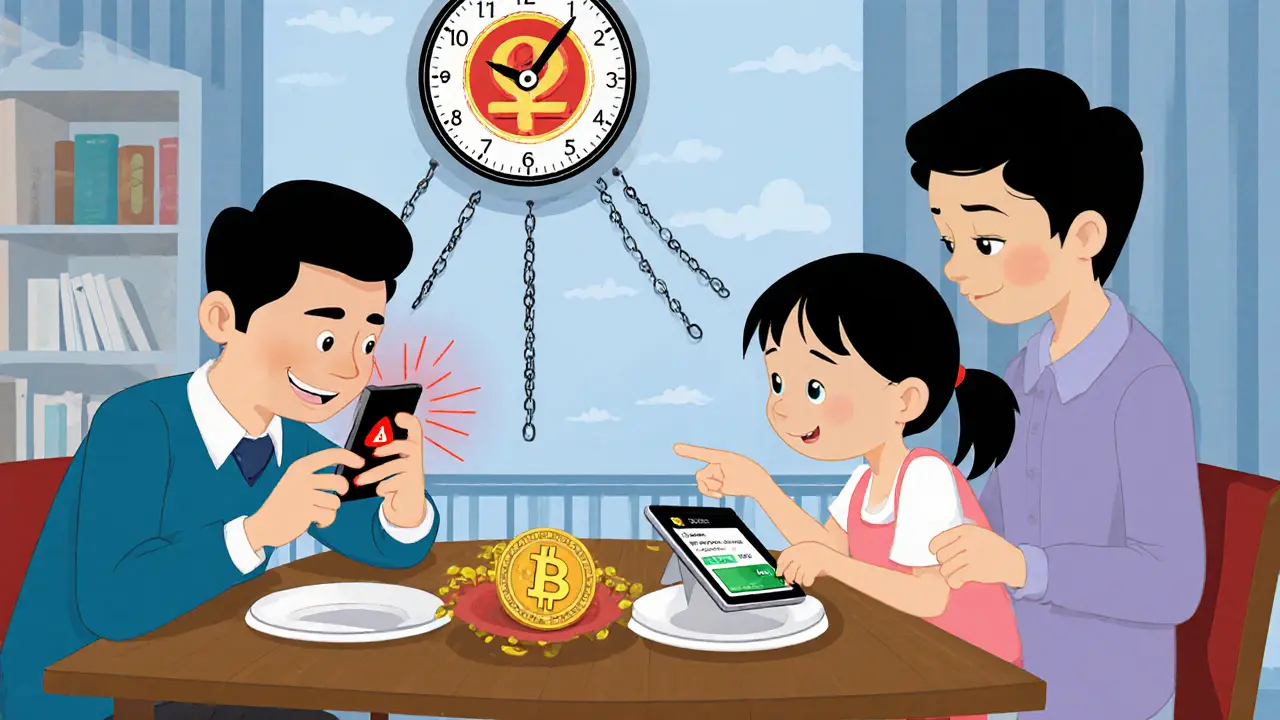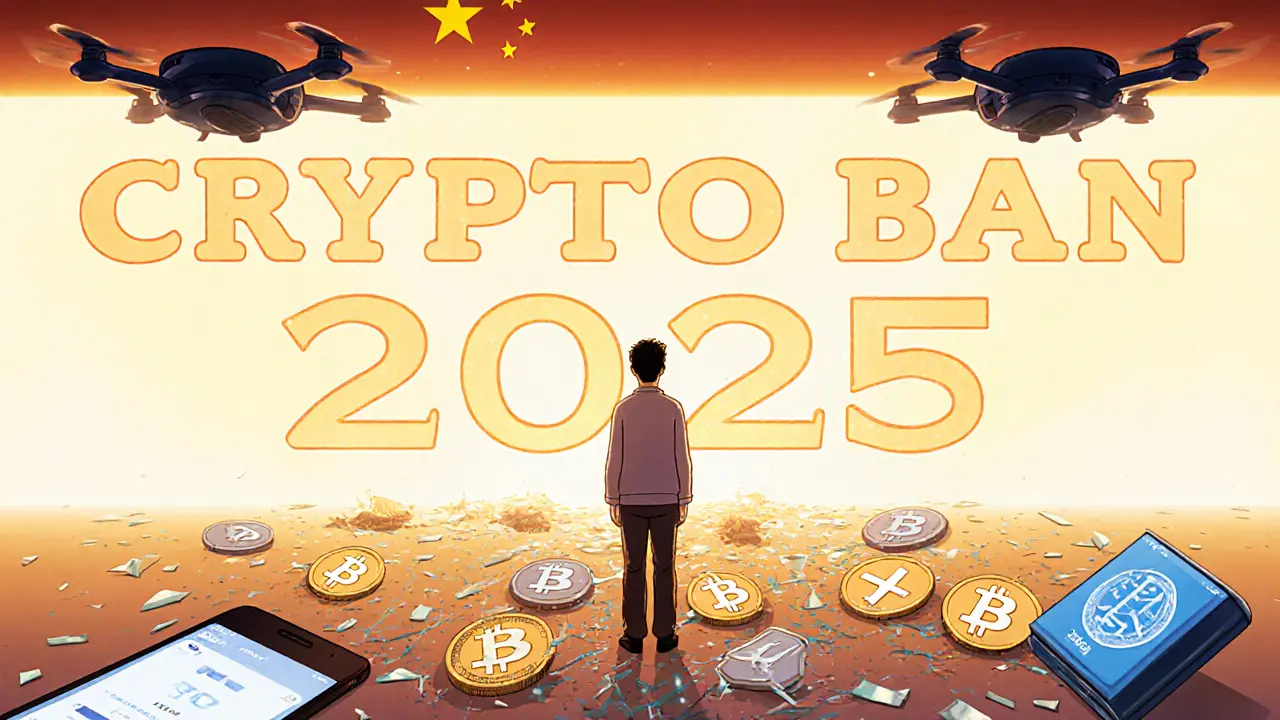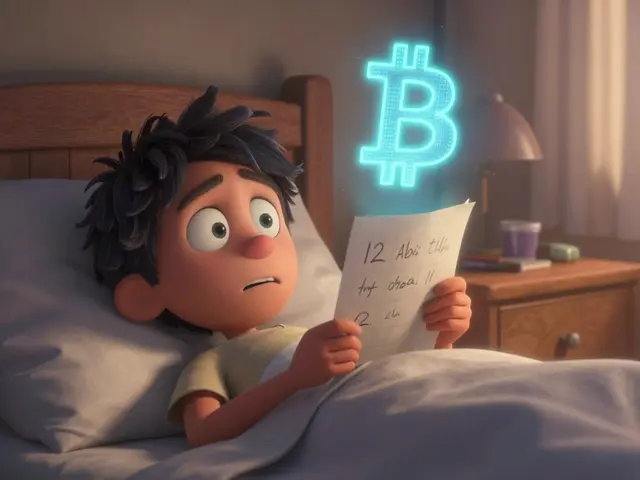Crypto Exchange Legal Checker for China
As of June 1, 2025, every cryptocurrency exchange is illegal for Chinese residents to use. This tool confirms whether a specific exchange is legal in China based on the official ban.
Enter an exchange name and click "Check Exchange" to verify legality.
As of June 1, 2025, every cryptocurrency exchange is illegal for Chinese residents to use. Not some. Not most. All. Whether it’s Binance, Coinbase, OKX, or a tiny peer-to-peer app you found on Telegram - using any of them violates Chinese law. This isn’t a gray area. It’s a hard stop. If you’re living in China, accessing a crypto exchange puts you at serious legal risk.
Why You Can’t Use Any Crypto Exchange in China
The People’s Bank of China (PBOC) didn’t just tighten rules in 2025 - they erased the entire playing field. On May 30, 2025, they issued a final, unambiguous order: no trading, no mining, no holding, no transferring, no OTC deals. Nothing. The ban covers every type of digital asset, from Bitcoin to Dogecoin to tokenized stocks. It applies to centralized exchanges, decentralized platforms, and even apps that let you buy crypto with WeChat Pay. The law doesn’t care if you’re using a VPN. It doesn’t care if you’re trading on a foreign site. If you’re in China, you’re under the law.This wasn’t sudden. It was the end of a 16-year crackdown. Starting in 2009, China began blocking virtual currencies from being used to buy real goods. By 2013, banks couldn’t touch Bitcoin. In 2017, domestic exchanges were shut down. Mining was outlawed in 2021. Each step narrowed the door. The June 2025 decree slammed it shut and welded it shut.
What Happens If You Get Caught
The penalties aren’t warnings. They’re real. If authorities find you’ve traded crypto, they can freeze your bank accounts. They can seize your assets - even cash you used to buy Bitcoin. In serious cases, you can face criminal charges. The Ministry of Public Security actively monitors financial transactions for signs of crypto activity. Banks are required to flag any unusual transfers linked to known crypto platforms. Even if you think you’re hidden, your digital footprint is tracked.It’s not just about the trade. Simply downloading a crypto app like Binance or KuCoin can trigger a red flag. Internet companies in China are legally required to block access to crypto websites and report users who try to bypass those blocks. If you’re using a VPN to access an exchange, that’s another violation. The system is designed to catch you before you even complete a trade.
Exchanges You Must Avoid (Even If They Say You Can Use Them)
Here’s the list: every major exchange is off-limits. No exceptions.- Binance
- Coinbase
- OKX
- Kraken
- Bitfinex
- KuCoin
- Gate.io
- Huobi (yes, even though it was founded in China)
- Bybit
- Phemex
- Any decentralized exchange (DEX) like Uniswap or PancakeSwap
- Peer-to-peer platforms like LocalBitcoins or Paxful
- OTC desks operating in China
Some of these platforms used to say they didn’t serve Chinese users. That’s irrelevant now. The law doesn’t care what the exchange says. If you’re in China and you use them, you’re breaking the law. The government has forced these platforms to actively block Chinese IP addresses and ban accounts linked to Chinese phone numbers or IDs. But if you find a way around those blocks - you’re still violating the law.

Why Other Countries Are Different
Compare this to places like the U.S., Japan, or Singapore. In those countries, crypto exchanges are licensed, regulated, and monitored. Users must pass KYC checks. Exchanges report suspicious activity. The system works within a legal framework.China doesn’t have a framework. It has a wall. No licenses. No exceptions. No compliance. No “if you follow the rules.” The government’s goal isn’t to regulate crypto - it’s to eliminate private control over money. That’s why they created the digital yuan. It’s not an alternative because it’s better. It’s an alternative because it’s controlled.
What You Can Legally Use Instead
The only digital money you can legally use in China is the digital yuan - also called e-CNY. It’s issued by the People’s Bank of China. It works through apps like Digital Yuan Wallet, linked to your real identity. You can pay for groceries, taxis, or bills. You can’t trade it. You can’t speculate on it. You can’t send it overseas. But it’s legal, safe, and widely accepted.Traditional banking, Alipay, and WeChat Pay remain your main tools for everyday transactions. Investment options are limited to government bonds, mutual funds approved by regulators, and real estate. There’s no legal path to Bitcoin, Ethereum, or any other cryptocurrency. If you want exposure to digital assets, you have to look outside China - and that means relocating.
What About Blockchain?
You might hear that blockchain is allowed in China. That’s true - but only under strict conditions. The government supports blockchain for supply chain tracking, land registry, and public services. But it’s not the same as crypto. Blockchain without tokens is just a database. China is building its own version of the technology - one where the state controls who can access data, who can write to the ledger, and what transactions are valid.If you’re a developer in China working on blockchain projects, you can do so - as long as you never touch cryptocurrency. Any integration with Bitcoin, Ethereum, or DeFi protocols is illegal. The line is clear: innovation is welcome. Decentralization is not.

What If You’re a Chinese Citizen Living Abroad?
If you’ve moved out of China permanently and have legal residency elsewhere, the rules change. You can use exchanges in your new country. But if you’re still a Chinese citizen - even if you live in Canada or Australia - you’re still subject to Chinese law if you return. The government can track your assets if you transfer money back into China. Many Chinese expats avoid sending crypto profits home for this reason.If you’re on a tourist visa or temporary work permit, you’re still in China’s legal jurisdiction. Using a crypto exchange while visiting China is just as risky as using one while living there.
Why This Ban Won’t Change Soon
Some people think the ban will lift when Bitcoin hits $100,000 or when China needs liquidity. Don’t count on it. The government sees crypto as a threat to financial control, monetary sovereignty, and social stability. The digital yuan is their answer - not a backup, but a replacement. They’re investing billions into making it the dominant digital payment system. Letting crypto back in would undermine that.There’s no sign of relaxation. Enforcement is stronger than ever. Financial institutions are fined for even accidental crypto exposure. Tech companies are punished for failing to block crypto content. The system is built to catch you - and it’s working.
Bottom Line: No Safe Way In
There is no legal loophole. No gray area. No “just this once.” If you’re in China, using any crypto exchange is illegal. The risk isn’t just losing money - it’s losing your bank account, your freedom, or both. The only safe choice is to avoid all exchanges completely.If you want to hold crypto, you have two options: leave China permanently, or accept that you won’t be able to access it legally. There’s no middle ground. And trying to find one will only get you into trouble.
Can I use a VPN to access Binance or Coinbase from China?
Using a VPN to access crypto exchanges from China is illegal. The government actively blocks and monitors VPN traffic linked to crypto sites. Even if you bypass the block, you’re still violating the June 2025 ban. Authorities can trace your activity through your bank transactions, phone number, or device ID. Getting caught can lead to account freezes, fines, or criminal charges.
Is it legal to hold Bitcoin if I bought it before 2025?
No. The 2025 ban applies retroactively to all holdings. Whether you bought Bitcoin in 2020 or 2024, owning it now is illegal. Authorities can seize crypto assets found in digital wallets linked to your identity. Even if you didn’t trade recently, possession alone violates the law. There are no grandfather clauses.
Can I use crypto for cross-border payments from China?
No. Sending or receiving crypto across borders is strictly prohibited. This includes paying for services overseas, buying foreign goods, or sending money to family abroad. The PBOC monitors all international transfers. Any crypto-related transaction will trigger an investigation. The only legal method for cross-border payments is through approved banks using the digital yuan or traditional wire transfers.
What about mining crypto in China?
Mining Bitcoin or any other cryptocurrency is illegal in China. The ban on mining started in 2021 and was fully enforced by 2023. Any hardware found running mining software can be seized. Individuals and businesses caught mining face heavy fines and possible criminal prosecution. The government considers mining a waste of energy and a threat to financial control.
Can I open a crypto account if I’m a foreigner living in China?
No. The ban applies to anyone physically present in China, regardless of citizenship. Foreigners using crypto exchanges while in China are subject to the same penalties as Chinese citizens. Banks and payment providers are required to report all suspicious activity - including crypto transactions by foreigners. Your residency status doesn’t protect you.
Are decentralized exchanges (DEXs) safer than centralized ones?
No. DEXs like Uniswap or PancakeSwap are just as illegal as centralized exchanges in China. The ban covers all forms of crypto trading, regardless of platform structure. Even if you don’t need to sign up, your IP address, wallet address, or transaction pattern can be traced. The government monitors blockchain activity directly. Using a DEX doesn’t make you anonymous - it just makes you harder to catch, not legally safe.
Can I invest in crypto through stocks or ETFs based in China?
No. China’s securities regulators have banned all crypto-related ETFs, trusts, and stock investments tied to cryptocurrencies. Even companies that claim to have exposure to blockchain or crypto mining are under scrutiny. Any product marketed as a crypto investment is illegal. The only approved investment products are those regulated by the China Securities Regulatory Commission (CSRC), and none include crypto assets.
What if I accidentally received crypto in my wallet?
Receiving crypto - even by accident - is still a violation. The law doesn’t distinguish between active trading and passive receipt. Authorities may require you to prove you didn’t initiate the transaction. If you can’t, you could still face penalties. The safest course is to immediately transfer the crypto out of your wallet and report it to your bank, though even that carries risk. Avoiding crypto entirely is the only guaranteed legal option.
Is the digital yuan the same as Bitcoin?
No. The digital yuan is a central bank digital currency (CBDC) controlled entirely by the People’s Bank of China. It’s not decentralized. It’s not anonymous. You can’t mine it or trade it for profit. It’s simply a digital version of the Chinese yuan, designed to replace cash and improve government oversight of money flow. Bitcoin is a decentralized asset with no central authority. They serve completely different purposes.
Will China ever allow crypto again?
There is no indication that China will lift the ban. The government views crypto as a threat to its monetary control and financial stability. Instead of permitting private digital currencies, they’re doubling down on the digital yuan and state-controlled blockchain systems. Unless there’s a major political shift, the ban will remain in place indefinitely. Any rumors of legalization are speculation, not policy.




16 Comments
Sunny Kashyap
This is why India should never follow China’s path. Crypto is freedom. They’re just scared people will stop trusting their crap currency.
james mason
How quaint. A nation that can’t handle financial autonomy thinks it can dictate global monetary evolution. The digital yuan is a surveillance tool dressed as innovation. How tragic that a civilization with such ancient wisdom now chooses control over creativity.
Anna Mitchell
I know it sounds scary, but honestly, this is actually good for people who just want to use money without drama. The digital yuan is simple, safe, and works great for daily life. No stress, no hacks, no FOMO. Sometimes less is more 💛
Pranav Shimpi
bro the ban is real but u need to know one thing - even if u use vpn, ur phone number and bank is linked. they track ur wechat pay history and if u send money to binance wallet even once, u r flagged. also, mining rigs? they do drone scans now in guizhou. if ur house has extra heat and loud fans, police knock. i know a guy who lost his car and 200k rmb. dont even try.
jummy santh
As a Nigerian who has watched our own financial struggles, I find China’s stance both fascinating and deeply instructive. While many in my country chase crypto as a lifeline, I see how absolute state control over money can prevent exploitation - even if it comes at the cost of individual liberty. The digital yuan is not evil; it is an assertion of sovereignty. We must ask: whose freedom are we really protecting when we champion unregulated digital assets? Perhaps true financial dignity lies not in chaos, but in clarity - even when it is imposed.
Kirsten McCallum
Control is the only moral currency. Everything else is noise.
Brian Collett
Wait, so if I’m a foreigner in China on a work visa and I use Coinbase, I’m at risk too? Even if I don’t have a Chinese bank account? That’s wild. Do they actually prosecute foreigners? Or is it just account freezes and warnings?
Herbert Ruiz
The article is accurate but lacks nuance. The PBOC didn’t ban crypto because of control - they banned it because retail investors were losing money en masse and causing social instability. This isn’t authoritarianism. It’s paternalistic economic policy. Similar to how the U.S. banned gambling in certain states to protect citizens from themselves.
Saurav Deshpande
They’re not banning crypto… they’re hiding it. The real plan? They’re secretly hoarding all the Bitcoin and Ethereum mined before 2021. They’ve got private vaults in Tibet and deep underground in Chengdu. The digital yuan? Just a distraction so we don’t notice they own 15% of all BTC. Wake up. They want to control the world’s money by owning the assets first. This is phase one.
Paul Lyman
Hey, if you’re in China and you’re reading this - you’re not alone. I know it feels like you’re stuck, but you’re not broken. The digital yuan isn’t the end - it’s a new beginning. Focus on building skills, saving in e-CNY, and planning your next move. Maybe one day you’ll be abroad, and then you can trade again. Until then, stay safe, stay smart, and keep your head down. You got this 💪
Frech Patz
Could you clarify the legal distinction between holding crypto assets versus transacting with them under the 2025 decree? Is possession alone prosecutable, or is intent required?
Derajanique Mckinney
so like… if i buy btc on binance while in shanghai and then leave the country… do they still come for me? 😳 also why is everyone so mad? it’s just money lol 🤷♀️
Rosanna Gulisano
People who trade crypto are gambling addicts. This isn’t freedom. It’s addiction. China did the right thing. End of story
Sheetal Tolambe
I’m from India and I’ve been thinking about this a lot. It’s scary but also makes sense in a way. Maybe we need to think less about ‘can I trade?’ and more about ‘what kind of system do I want to live in?’ The digital yuan isn’t perfect, but at least it’s stable. I’m not sure I’d trust crypto with my life savings either.
gurmukh bhambra
They’re using this ban to push facial recognition and AI tracking into every wallet. Next thing you know, your e-CNY app will rate your spending habits and tell you if you’re ‘worthy’ of buying rice. This isn’t finance - it’s social credit 2.0. They’ve been planning this since 2015. Don’t believe the ‘financial stability’ lie.
Will Barnwell
Most of this is correct but you’re ignoring that Chinese citizens are still finding ways to trade. OTC traders in Guangdong are moving millions daily. The ban is symbolic. Enforcement is patchy. People always find a way. The government just needs to pretend they’re in control.